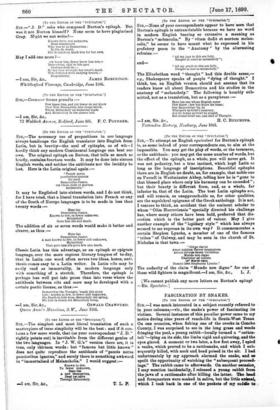[TO THE EDITOR OF THE "SPECTATOR. "] SIR,—To attempt an English
equivalent for Burton's epitaph is, as some indeed of your correspondents see, to aim at the impossible. You may get the play of words, or the terseness, or the antithesis : you may get the same number of words, but the effect of the epitaph, as a whole, you will never get. It was not pedantry, but a true instinct, which kept Latin so long as the language of inscriptions. Beautiful epitaphs there are in English no doubt, as, for example, that noble one on Purcell in Westminster Abbey, telling how he is "gone to that blessed place where only his harmony can be exceeded "; but their beauty is different from, and, as a whole, far inferior to, that of the Latin. The best Latin epitaphs are, and will remain, as unapproachable as, for other qualities, are the sepulchral epigrams of the Greek anthology. It is not, I venture to think, an accident that the eminent scholar to whom " Olim Harroviensis " specially directed his challenge has, where many others have been bold, preferred that dis- cretion which is the better part of valour. May I give another example of the "lapidary style" which has always seemed to me supreme in its own way? It commemorates a certain Stephen Lynche, a member of one of the famous " tribes " of Galway, and may be seen in the church of St. Nicholas in that town:— " SUrpe clarus Amor militum Terror inimicorum Aetate juvenie Senex virtutibus Mundo non digno Exaltatur ad caelum 149 Marty unto Domini 1644 Stephanus Lynche."
The audacity of the claim "Mundo non digno" for one of
these wild fighters is magnificent.—I am, Sir, &c., L. J.
[We cannot publish any more letters on Burton's epitapi —En. Spectator.]






































 Previous page
Previous page